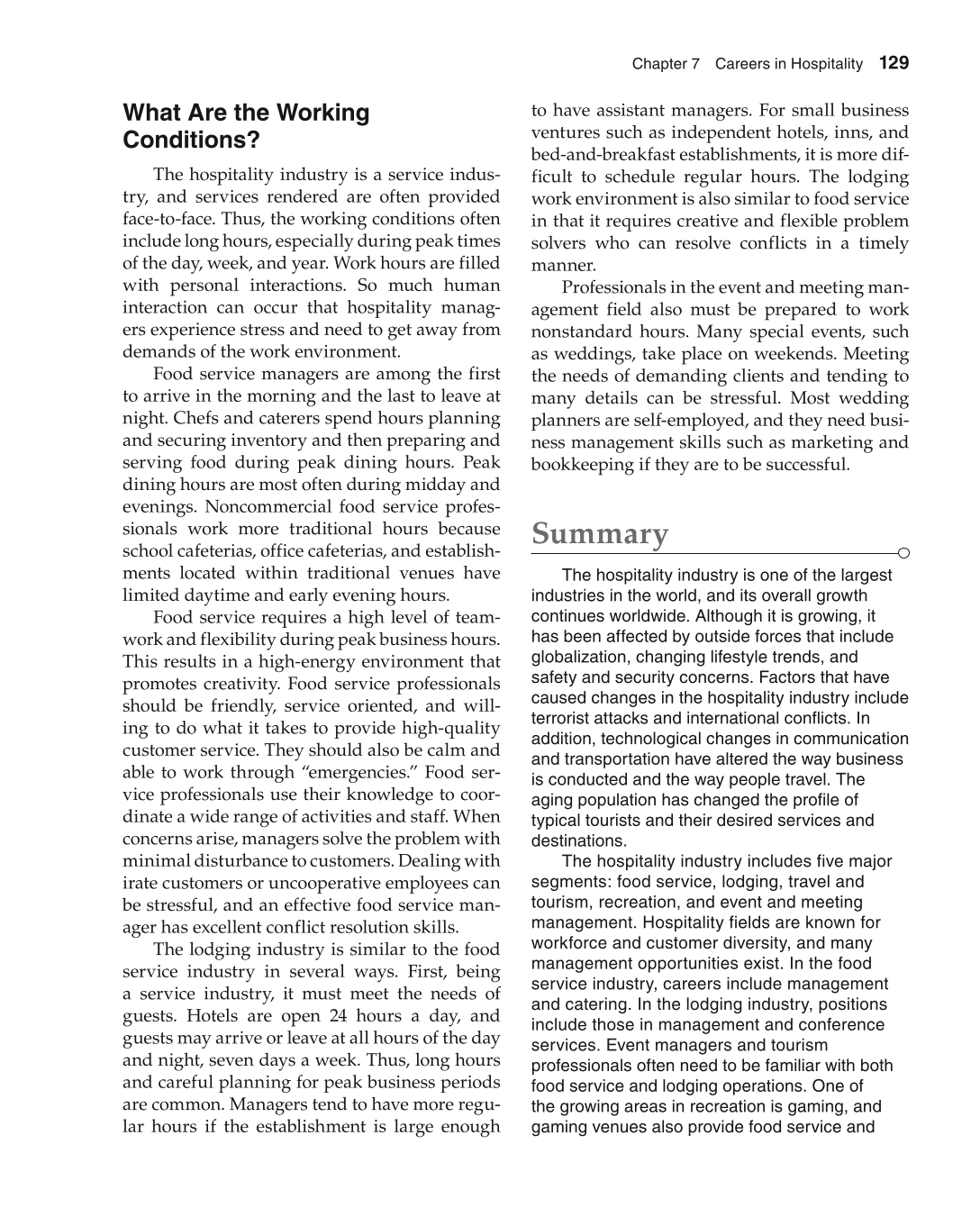Chapter 7 Careers in Hospitality
129
What Are the Working
Conditions?
The hospitality industry is a service indus-
try, and services rendered are often provided
face-to-face. Thus, the working conditions often
include long hours, especially during peak times
of the day, week, and year. Work hours are filled
with personal interactions. So much human
interaction can occur that hospitality manag-
ers experience stress and need to get away from
demands of the work environment.
Food service managers are among the first
to arrive in the morning and the last to leave at
night. Chefs and caterers spend hours planning
and securing inventory and then preparing and
serving food during peak dining hours. Peak
dining hours are most often during midday and
evenings. Noncommercial food service profes-
sionals work more traditional hours because
school cafeterias, office cafeterias, and establish-
ments located within traditional venues have
limited daytime and early evening hours.
Food service requires a high level of team-
work and flexibility during peak business hours.
This results in a high-energy environment that
promotes creativity. Food service professionals
should be friendly, service oriented, and will-
ing to do what it takes to provide high-quality
customer service. They should also be calm and
able to work through “emergencies.” Food ser-
vice professionals use their knowledge to coor-
dinate a wide range of activities and staff. When
concerns arise, managers solve the problem with
minimal disturbance to customers. Dealing with
irate customers or uncooperative employees can
be stressful, and an effective food service man-
ager has excellent conflict resolution skills.
The lodging industry is similar to the food
service industry in several ways. First, being
a service industry, it must meet the needs of
guests. Hotels are open 24 hours a day, and
guests may arrive or leave at all hours of the day
and night, seven days a week. Thus, long hours
and careful planning for peak business periods
are common. Managers tend to have more regu-
lar hours if the establishment is large enough
to have assistant managers. For small business
ventures such as independent hotels, inns, and
bed-and-breakfast establishments, it is more dif-
ficult to schedule regular hours. The lodging
work environment is also similar to food service
in that it requires creative and flexible problem
solvers who can resolve conflicts in a timely
manner.
Professionals in the event and meeting man-
agement field also must be prepared to work
nonstandard hours. Many special events, such
as weddings, take place on weekends. Meeting
the needs of demanding clients and tending to
many details can be stressful. Most wedding
planners are self-employed, and they need busi-
ness management skills such as marketing and
bookkeeping if they are to be successful.
Summary
The hospitality industry is one of the largest
industries in the world, and its overall growth
continues worldwide. Although it is growing, it
has been affected by outside forces that include
globalization, changing lifestyle trends, and
safety and security concerns. Factors that have
caused changes in the hospitality industry include
terrorist attacks and international conflicts. In
addition, technological changes in communication
and transportation have altered the way business
is conducted and the way people travel. The
aging population has changed the profile of
typical tourists and their desired services and
destinations.
The hospitality industry includes five major
segments: food service, lodging, travel and
tourism, recreation, and event and meeting
management. Hospitality fields are known for
workforce and customer diversity, and many
management opportunities exist. In the food
service industry, careers include management
and catering. In the lodging industry, positions
include those in management and conference
services. Event managers and tourism
professionals often need to be familiar with both
food service and lodging operations. One of
the growing areas in recreation is gaming, and
gaming venues also provide food service and
